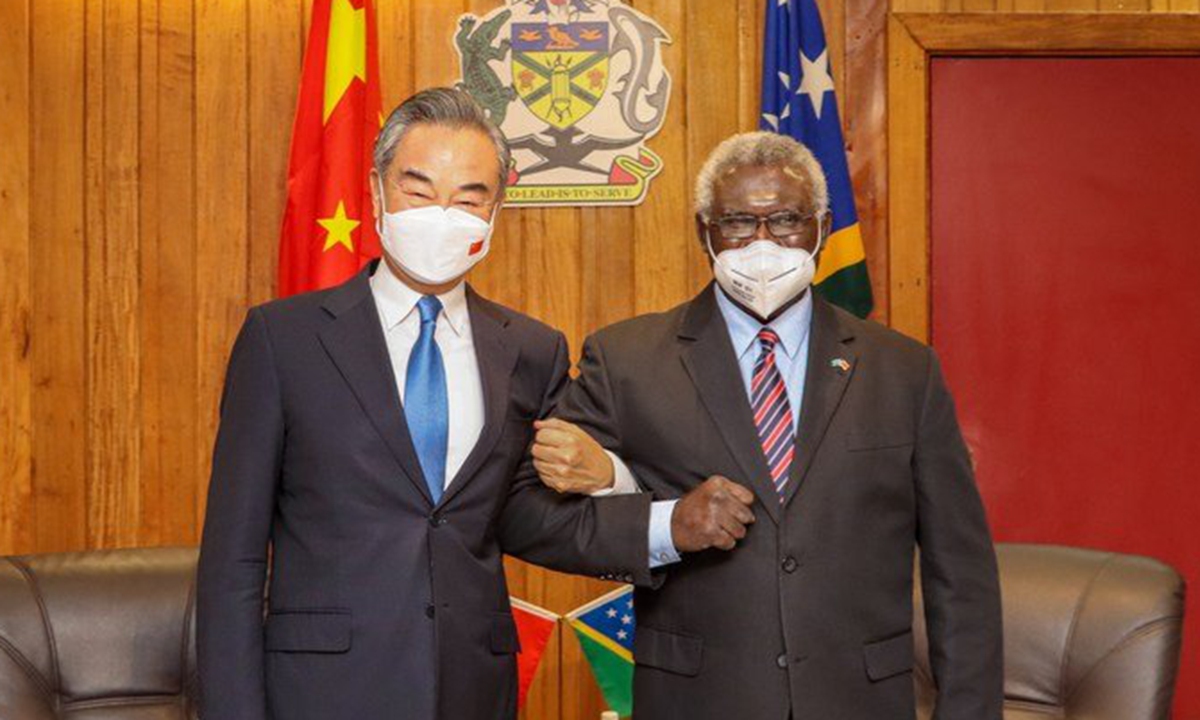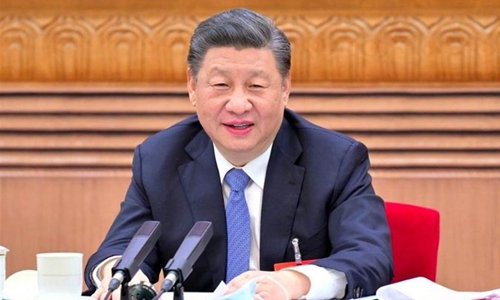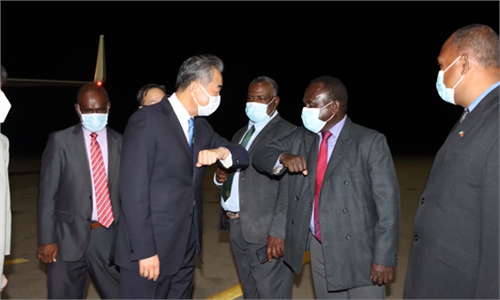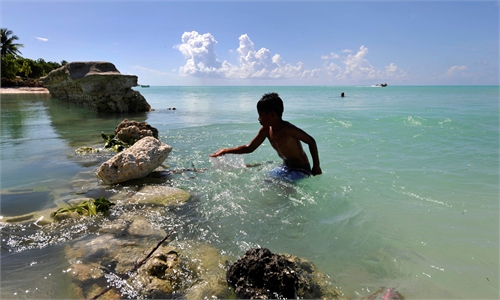The West fears its loss of power as Wang Yi travels to the Pacific: Australian scholar

Chinese State Councilor and Foreign Minister Wang Yi (left) holds arms with Solomon Islands Prime Minister Manasseh Sogavare after arriving in Solomon Islands for a visit on May 26, 2022. Photo: Courtesy of Chinese Ministry of Foreign Affairs
Editor's Note:
Chinese State Councilor and Foreign Minister Wang Yi's visit to the South Pacific countries is still undergoing. The trip has triggered concerns from the West, especially Australia and the US. Since the signing of a security pact between China and the Solomon Islands in April, the West has been very sensitive to China's moves in the region. They have intensively hyped that China is competing for influence in the Pacific. What are the intentions behind the smear campaign against China? Is the Albanese administration's attitude toward cooperation between China and South Pacific countries rational? Global Times (GT) reporter Lu Yuanzhi talked to Robert Barwick (Barwick), research director for the Australian Citizen Party, over these issues as well as future China-Australia relations.
GT: Some Australian experts said Wang Yi's trip to South Pacific has made a lot of Western analysts nervous. What is your take?
Barwick: First of all, I think the nervousness is self-serving. It serves an agenda. We're at a time in history where the US' position as the single superpower in the world supported by the UK, Australia, and others cannot be maintained any longer. America's only superiority over the rest of the world is the amount of money it spends on weapons and actual forward projection of power. That's all it has.
China has worked very hard to build up its economy and offer the world the Belt and Road Initiative to share a kind of win-win economic approach. With that economic rise comes economic power. Naturally, the countries of the world that all used to automatically assume that America was No.1 now want to do business with China and often prefer to do business with China. This is making the American establishment and the British establishment very nervous, not because China is any kind of a threat, but because they see that they are rapidly losing their position. So what they have to do is twist what China is doing into some kind of a threat.
That's why I think the nervousness is self-serving. To a degree, the way it's presented is fake. They're not nervous because of anything China represents, but because of the power that they are losing. And the countries of the Pacific clearly want to do these deals for the economic benefits that they bring, and that is their right.
The only country that's treating them as sovereign countries is China. We're saying "this is our backyard, get out" and that's wrong.
GT: Some Western and US media hyped that Australia's new foreign minister Penny Wong hastily traveled to Fiji ahead of Wang Yi's visit. How do you see Wong's visit to Fiji? What's the purpose?
Barwick: We have had a change of government, and the previous government was hysterical in its rhetoric. Former Australian prime minister Scott Morrison and former minister for defense Peter Dutton were demented in the way they talked about China. There has been a shift in Australian public perception in the last few years when the Australian people have been induced to believe this hype that China is a "threat."
When the Solomon Islands announced that it was going to sign the security deal with China, it was in the middle of our election campaign, and the Labor Party, which is now the government, saw an opportunity to act tough on China and attack the government for letting this happen in our "backyard." Certainly we have an interest in this region, but we don't own those countries in the Pacific. To a large degree, the Labor Party has to back up their own rhetoric and run over there and has to pay more attention to the Pacific.
Penny Wong is a much more sensible and measured person than Morrison and Dutton. She's going to be trying to show the Pacific that Australia is really interested in the region because the Pacific countries want to sign deals with China.
But there's another side to it, which is that both parties, major parties in our government, have this idea that we, Australia, are the deputy sheriff to the US in the Pacific. In the region, it is our responsibility to maintain the unipolar supremacy. That's what we're responsible for. That is an explicit thought that they have.
I strongly suspect that these politicians are more worried about how the US would see Australia's negligence in letting China into the South Pacific. They are more worried about that than about how the Australian people would see it, such as the subservience we have to the US. Penny Wong is over there for that reason as much as anything. This is my opinion, but it's based on seeing their language over quite a few years. She's over there showing the US that we're getting our act together.
GT: During his trip, Wang Yi is visiting eight South Pacific countries. Many Australian elites believe Wang's trip will heavily impact Australia. Why do you think they have such an idea? Is this because of Australia's long-term neglect of the region?
Barwick: First of all, I have not seen how it can heavily impact Australia. We hype up the idea that there could be military bases. These countries said there are not going to be any military bases. These are just security deals to make sure to bring law and order, and economic development that China can help with can go ahead.
Why is that a "threat" to Australia? It makes sense that a Pacific country signs deals with everybody: with Australia, with the US and with China. It's just that we have decided that we can't match China economically, partly because of the way we run our economy. There's a way you can run your economy where the government plays a very active role with long-term investment to make sure the important infrastructure is developed. That's the framework for everything else to be built and successful so that the rest of the economy can work. That's China's model.
China does that the best in the world. We used to do that. The Americans used to do that. But we don't do that anymore. We let the private sector run everything for maximum profit. And that's the way we also choose to do with our foreign policy, our international engagement. Now the Chinese offer a much better deal. The Solomon Islands and all these other countries are taking that deal and that reflects on us, just because of our incapacity to match it. But there's no military threat. That part is completely hyped up.
And the analysis of how this might impact Australia is completely overboard in my opinion. The question of negligence is being put into the context of climate change, because these countries are worried about climate change, and our government is seen as having been negligent. Otherwise we've done what we have always done in those areas of the world. It's just that we cannot match what China can offer, because China has got a much better economy. I think the negligence thing is overplayed. It assumes this idea that if we were doing our job right, we would be keeping China out of the South Pacific. Why? Why can't these countries do deals with China?
GT: After China and the Solomon Islands signed the security pact, Australia and other Western countries such as the US launched an intense smear campaign against China. What are their intentions? Do you think they reached their goal?
Barwick: They're reaching their goal for sure. Their intentions are to use these deals that China is signing with these countries and the fact that they include security pacts to prove their argument and assertion that China is an expansionary power and a threat, even though that is a complete misinterpretation of what these security pacts are.
I am very concerned that their goal is regime change in the Solomon Islands. They will use this to make an example of a country like the Solomon Islands, because its Prime Minister Manasseh Sogavare has already pointed out the foreign interference that's been taking place. We hypocritically in Australia make a big issue out of the fact - and the language is important here - we say that the Solomon Islands switched its allegiance from the Taiwan island to the Chinese mainland. No. Recognizing the nationality of an entity is not allegiance.
If that language is true, then we too are allegiant to China, as is the US, because almost all the world says the People's Republic of China is "the one China." That's all of our positions, and the Pacific Island countries that switched from recognizing the Taiwan island to recognizing the Chinese mainland are just in line with us. Why do we have that position if it's so bad? This is a very important issue for China. And those countries have been happy to do it, because I assume that's a condition of the deals that they want to do with China. That gets hot, though, the way that gets reported in Australia and to those countries. I saw reports such as saying that the Chinese have come and taken control of us. And so what I've been seeing in the Australian media is a lot of interviews with opposition figures in the Solomon Islands. Our media is hyping up how corrupt the prime minister of the Solomon Islands is for doing these deals. I've seen this before.
It starts with the press. It lays a foundation. Then next thing is uprisings. We claim that we need to send our troops to help restore law and order because we already have a security pact with the Solomon Islands. And the next thing, either through direct or indirect means, the government of that country is overthrown.

Photo: Courtesy of Robert Barwick
GT: The Solomon Islands Prime Minister Sogavare once seemed to suggest that an invasion of Solomon Islands was being considered by Australia in the wake of the security pact. What do you think makes the Solomon Island withstand pressure from Australia and carry on cooperation with China?
Barwick: The short answer is that it's a better deal. Do you know what we offer the Solomon Islands? We say to them if you do deals with us, you can be our cheap labor in our farms. We'll give you thousands of visas so that you can come over and pick the fruits of our trees and our vegetables in our farms. They can earn money doing that than they would earn at home. Even though there's a lot of exploitation of those workers when they come over here.
Actual Solomon Islanders have testified to the media and parliamentary committees about how they thought they'd be earning hundreds of dollars a week, though they ended up being paid much less than that. That's what we offer them.
They call it the Solomons because it's named after the King of Solomon's Mine. It's very, very rich in minerals and resources. They could make their own income from having their own infrastructure in this regard, having their own mines, their own processing, and so on. But that requires investment. China is offering investment. That represents the potential income which represents a lot more money than we can match with bringing them over here as cheap labor.
It's a better deal and it is right. If we were offered a better deal, we would take it. The irony is that we have got a better deal. We had had the best trading relationship with China of any country in the world. It was so much in our favor. But our politicians are actively trashing that relationship.
I think Sogavare is a brave person to resist this. And, by the way, his reference to an invasion, it was grounded on some of the language, some of the rhetoric in Australia. When the news broke, well-connected people, who weren't in the government but were connected into layers of the government and foreign affairs, called for bombing the Solomon Islands as well as a regime change in the Pacific country. He heard that language and that's why he said it.
GT: In terms of Morrison's hard-line rhetoric toward the security pact, you said the election factor should be taken into account - "The craziest thing about this election right now is how both sides, the two major parties, see it as popular to act in a hostile way towards China." Now the election was over, do you think the new government's attitude toward the cooperation between China and the South Pacific countries will tend to be rational?
Barwick: I hope so. I'm disappointed with what I have seen so far, but my first hope is that at least the language and the communication become more civil and the perspective on the developments is more rational.
Penny Wong, by any measures, should be a distinct improvement on the foreign minister before her, who was in a government dominated by Scott Morrison and Peter Dutton. At crucial times in the last few years, when the debate became really extreme, Penny Wong said enough to take the heat out of it. It was very important. During the election, she didn't try as much because the election was on. And unfortunately, there was one incident in which she called China's deal with the Solomon Islands a security threat to Australia. This is completely wrong. But mostly of the time, she's quite sensible. So I'm hoping that continues.
The problem is when your premier communicated his welcome of the new government, what he received in response from our prime minister and our treasurer was a demand that before the relationship improves, China has to stop sanctioning and let our trade come back.
I know the background to the trade issue. That is actually a very simplistic interpretation of it, which fits the narrative in Australia. It's not true. And they should know that; therefore, what they said is actually an unreasonable thing. The first thing that needs to happen is that both sides get back to talking and then figure out what works best for the two countries. And that it would have been much more helpful if the prime minister and the treasurer had welcomed the premier's greeting and worked out a way to get talks started. They haven't done that yet. And in my public statements, I will be urging that.
GT: It fits the interests of the South Pacific countries most when they develop ties with different major powers. Do you agree with this viewpoint??
Barwick: I do. I think that the South Pacific countries have probably looked at the countries in Africa which have immensely benefited from China's investment in infrastructure. But the European Union has said it's very hard for other countries to match what China is doing. But nevertheless, there's a lot of rhetoric there. I have seen some leaders of those African countries or people in the government saying "we will happily do deals with all of you. You could compete with each other for how you can benefit our economies. That's good." Of course that makes sense, right? Why not?
We also do it. Australia has a comprehensive strategic partnership with China and we have an alliance with the US as well. That's a pretty impressive standing arrangement. We have an incredible trade relationship with China. It works for us. Every country should have the right to do that. If there were not all this Cold War-style demonization of China - and I don't know how well Chinese people can relate to this, in the Cold War, the communists were evil. People saw everything in this black and white, two dimensional terms - if they're the communists, they're bad. Everything they did was viewed with suspicion. And that's what we've got back into. If people weren't looking at that way, and they looked at these events on the face of them and saw them for what they were, the Pacific countries would see that's a trade deal, a trade arrangement, an investment agreement, which is clearly good for those countries. But we see it in a different perspective, which is completely distorted. So I disagree with it.
GT: The Australian Citizens Party calls to "end the dangerous 'drums of war' rhetoric pushing Australia to join the USA and UK in confronting China, and prioritize diplomacy to resolve tensions respectfully." As Anthony Albanese has become new prime minister of Australia, what's your view on the prospects of China-Australia relations?
Barwick: It's all hope at the moment, because the early signs haven't been terrible. We haven't made it worse, but I hope we would move quickly to make it better. But one of the problems is for a country like ours, a lot of the key decision-making doesn't take place in our country. Our security is entirely dependent on our alliance with the US.
We let our decision-making be defined by the decisions taken in Washington and London. That's the fear. This government does not represent a change to that. This government represents a nicer face. This government represents more civil language, potentially. They do not represent a change to that arrangement. They do not see things in that way, because the last time an Australian government actually tried to carry out a certain independent foreign policy, a truly independent one, was in the 1970s in the Gough Whitlam Labor government, and when he did, the American and British intelligence agencies contributed to the demise of his government.
Since then, there have been some slightly brighter patches. In the late 1980s and early 1990s, there was an intention to try to establish good relations with the region, like ASEAN and China. We had that intention and our foreign affairs department worked hard to do it. But now those intentions have all gone. We are telling the region we are a white country in Asia, and we are going to stick with the US and the UK, just like we did for a century.
That means that before a party like us is successful at changing public opinion and getting shifts in how policy is formed, there's actually very little we can do to improve the relationship because the decisions will be made elsewhere.



